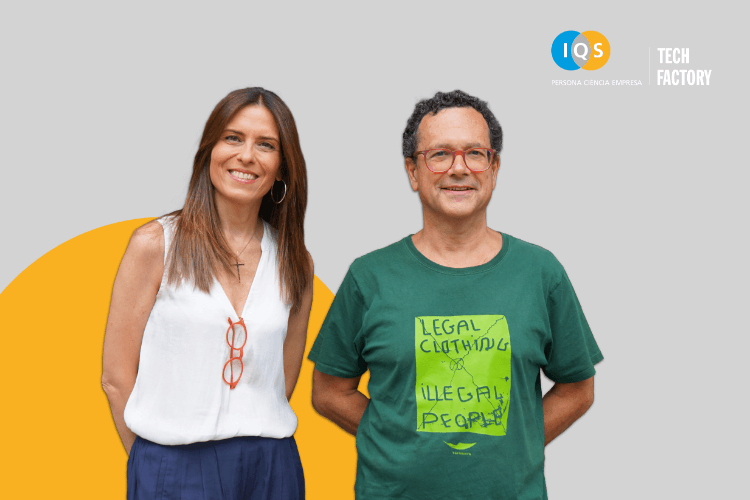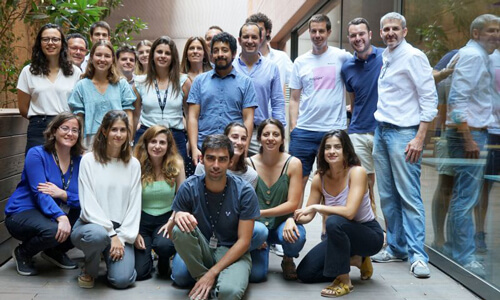Interview with IQS Tech Factory

IQS Tech Factory is the entrepreneurship unit at IQS. It was launched seven years ago, and in 2022 it has begun a new stage with the aim of promoting entrepreneurship throughout the entire IQS community.
Today we’re discussing future projects in this unit with two of its managers: Roser Grau, IQS Tech Factory Manager, and Dr Antoni Olivé, professor and researcher with the IQS School of Management.
Tell us, what is the current offering at Tech Factory?
A. Olivé. Tech Factory is the IQS department that is at the service of the entire IQS community, about 20,000 people in total, in terms of the process of starting and creating new companies. It is aimed at students, alumni, professors, researchers, and all employees.
What do we mean by service? We aim to be fully present and accessible for everyone engaged in this process, consisting of four fundamental pillars, all with unique activities:
• Inspire, or sow the “seed of entrepreneurship” for everyone.
• Educate, through various official and internal programmes.
• Incubate, covering the time from when the idea arises up to having a team in place to make it a reality and validate the model.
• Accelerate, from the first customer invoice to reaching rocket speed and being able to grow.
R. Grau. We offer service and inspiration to the entire IQS community, which is how we can really reach those who are truly interested in entrepreneurship. We create fertile ground with the conditions for everything to take root and grow in the most favourable way, and for talented individuals at IQS to understand what we do. Tech Factory is now seven years old. Currently, we are focusing on gaining greater awareness and presence internally, and continuing to be recognized outwardly, as we have been thus far.
The seed has to be sown among the students. After their education, when they become alumni, we want them to remember that Tech Factory is there for them and that they can reach out to us if they wish. IQS will continue offering activities that inspire alumni and presenting services that facilitate the creation of startups and meeting their needs at every stage of an entrepreneur’s journey. If you ever want to go down this path, you can find us here and you’ll see that this is the place for you. We want to be your guiding light.
Where should focus when seeking entrepreneurs?
R. Grau.Before, the acceleration program was really focused on attracting industrial startups. Now, we have extended this scope to potential entrepreneurs from within IQS and we encompass both faculties (the IQS School of Engineering and the IQS School of Management) so everyone can take advantage of what we offer.
Entrepreneurship has been part of the DNA at IQS for over 100 years. It’s important to unearth talent and grow connections with the institution. Having two schools is a privilege that makes us particularly unique. From a strategic point of view, being able to access all this talent is a very important distinguishing element that sets our Tech Factory department apart compared to other entrepreneurial units.
“Being able to access all this talent from both the Schools of Engineering and Management is a very important distinguishing element that sets our department apart compared to other entrepreneurial units”
A. Olivé.In addition, there are profiles that hadn’t really been addressed thus far, such as individuals associated with the School of Management who, for example, want to develop an application without using IQS technology. We have also seen mixed projects that have both management and engineering aspects. All of them now have resources and options.
What tools do you provide to help and support the maximum number of future entrepreneurs and make their business idea a reality?
R. Grau.As a result of our desire to promote “mixed projects” in which management and technological innovation are combined, it occurred to us to create the Scientific Advisory Board, led by Dr Marco Antonio Pérez, (professor of Industrial Engineering at the School of Engineering) and, Dr Arnau Pla, Business Development Manager with the IQS Tech Transfer unit. These two individuals have a cross-disciplinary vision of IQS and all the advancements, knowledge, and experiences that are developed here. With that in mind, they can detect any need or opportunity, such as management profiles that may need technical support from a specific experience or research group, or engineering profiles that may need management support. It’s about forging connections and acting as facilitators to make countless ideas come true.
In addition, as facilitators, our role is also to connect our entrepreneurs and their projects with the ecosystem that surrounds us and its resources.
Finally, we launched the widely successful inaugural edition of our star programme this past July, the Startup Challenge, which is aimed at young researchers and students. It featured 14 proposals from both Schools (Management and Engineering), along with ideas from students and researchers and professors alike.
What does the IQS Tech Factory Startup Challenge programme consist of in general terms?
R. Grau. It’s an intensive pre-acceleration programme focused on the early stages of starting new businesses in which researchers have the opportunity to acquire knowledge and skills related to entrepreneurship, solving problems, and understanding market needs through education and mentoring. At the end of the programme, people who come with a more or less developed business idea advance into a position to make one of the most important decisions: move forward or abandon the project.
A. Olivé. Within the research done at IQS, many technological developments remain within basic or applied science, which need latent incubation in business matters to help them reach the market: making business plans, discovering potential customers of this technology, how to launch it on the market, and what business model, financial, and HR structure they need behind it and so on. We must create all of this so the scientific capsules we have offered previously in the IQS groups can advance and incubate their latent potential.
“Within the research done at IQS, many technological developments need latent incubation in business matters to help them reach the market”

How do you detect innovative ideas from within the classrooms and help them to become a reality?
A. Olivé. It works in two ways. We make ourselves available and seek interesting business initiatives, starting by taking advantage of the Final Degree Projects undergraduate students create through their own ideas, especially management students. With engineering students, the process is a little different: we must identify the technologies they’re working with and offer them the possibility of finding commercial applications that address real problems. This involves an intense task of making ourselves available.
Another area of collaboration within the classrooms can be found in the master’s degrees at IQS, such as the Master in Global Entrepreneurial Management (MGEM), where we work on finance and business models. We have 10 companies selected and assigned to 10 students who have to do market studies, design a business model, and make an assessment of the assigned company. We’re proud to offer this type of collaboration, which lies between inspiring and educating.
In short, we seek to make entrepreneurship increasingly relevant within the official and internal curricula of undergraduate programmes and master’s degrees taught at IQS, and we do so by highlighting concrete examples of success stories such as the startups Aortyx or Gloo.
“We seek to make entrepreneurship increasingly relevant within the curricula of undergraduate programmes and master’s degrees taught at IQS”
To wrap up, could you tell us about Disrupting the Company, the programme you have launched together with ACCIÓ, the Catalonia Trade & Investment Agency?
R. Grau. ACCIÓ created a training course aimed at companies that want to learn how to innovate in an open and collaborative way. IQS Tech Factory won the competition with the Disrupting the company programme led by Dr Carles Malet, Associate Director of Strategy and Business at IQS. It is a fully online program programme that features mentoring and a final brokerage session that will be held in person at IQS on 30 September.
When a company wants to innovate, its pace is often too slow for market demands. Startups are cells that make it easier and faster to produce innovation. Large companies contact a startup that can handle their innovation needs, or does so internally.
Disrupting the Company offers, in short, an introduction to those interested in corporate entrepreneurship. In this first edition, it featured participation from 72 companies.

